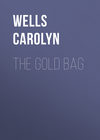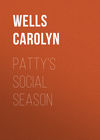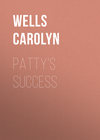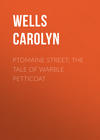Kitabı oku: «The Gold Bag», sayfa 11
XVII. THE OWNER OF THE GOLD BAG
The next day I received a letter addressed in modish, angular penmanship, which, before I opened it, I felt sure had come from Mrs. Cunningham. It ran as follows,
Mr. HERBERT Burroughs,
Dear Sir: Yes, I have lost a gold bag, and I have known all along that it is the one the newspapers are talking so much about in connection with the Crawford case. I know, too, that you are the detective on the case, and though I can’t imagine how you did it, I think it was awfully clever of you to trace the bag to me, for I’m sure my name wasn’t in it anywhere. As I say, the bag is mine, but I didn’t kill Mr. Crawford, and I don’t know who did. I would go straight to you, and tell you all about it, but I am afraid of detectives and lawyers, and I don’t want to be mixed up in the affair anyway. But I am going to see Miss Lloyd, and explain it all to her, and then she can tell you. Please don’t let my name get in the papers, as I hate that sort of prominence.
Very truly yours,
ELIZABETH CUNNINGHAM.
I smiled a little over the femininity of the letter, but as Parmalee had prophesied, Marathon Park was evidently no place to look for our criminal.
The foolish little woman who had written that letter, had no guilty secret on her conscience, of that I was sure.
I telephoned for Parmalee and showed him the letter.
“It doesn’t help us in one way,” he said, “for of course, Mrs. Cunningham is not implicated. But the bag is still a clue, for how did it get into Mr. Crawford’s office?”
“We must find out who Mr. Cunningham is,” I suggested.
“He’s not the criminal, either. If he had left his wife’s bag there, he never would have let her send this letter.”
“Perhaps he didn’t know she wrote it.”
“Oh, perhaps lots of things! But I am anxious to learn what Mrs. Cunningham tells Miss Lloyd.”
“Let us go over to the Crawford house, and tell Miss Lloyd about it.”
“Not this morning; I’ve another engagement. And besides, the little lady won’t get around so soon.”
“Why a little lady?” I asked, smiling.
“Oh, the whole tone of the letter seems to imply a little yellow-haired butterfly of a woman.”
“Just the reverse of Florence Lloyd,” I said musingly.
“Yes; no one could imagine Miss Lloyd writing a letter like that. There’s lots of personality in a woman’s letter. Much more than in a man’s.”
Parmalee went away, and prompted by his suggestions, I studied the letter I had just received. It was merely an idle fancy, for if Mrs. Cunningham was going to tell Miss Lloyd her story, it made little difference to me what might be her stature or the color of her hair. But, probably because of Parmalee’s suggestion, I pictured her to myself as a pretty young woman with that air of half innocence and half ignorance which so well becomes the plump blonde type.
The broad veranda of the Sedgwick Arms was a pleasant place to sit, and I had mused there for some time, when Mr. Carstairs came out to tell me that I was asked for on the telephone. The call proved to be from Florence Lloyd asking me to come to her at once.
Only too glad to obey this summons, I went directly to the Crawford house, wondering if any new evidence had been brought to light.
Lambert opened the door for me, and ushered me into the library, where Florence was receiving a lady caller.
“Mrs. Cunningham,” said Florence, as I entered, “may I present Mr. Burroughs—Mr. Herbert Burroughs. I sent for you,” she added, turning to me, “because Mrs. Cunningham has an important story to tell, and I thought you ought to hear it at once.”
I bowed politely to the stranger, and awaited her disclosures.
Mrs. Cunningham was a pretty, frivolous-looking woman, with appealing blue eyes, and a manner half-childish, half-apologetic.
I smiled involuntarily to see how nearly her appearance coincided with the picture in my mind, and I greeted her almost as if she were a previous acquaintance.
“I know I’ve done very wrong,” she began, with a nervous little flutter of her pretty hands; “but I’m ready now to ‘fess up, as the children say.”
She looked at me, so sure of an answering smile, that I gave it, and said,
“Let us hear your confession, Mrs. Cunningham; I doubt if it’s a very dreadful one.”
“Well, you see,” she went on, “that gold bag is mine.”
“Yes,” I said; “how did it get here?”
“I’ve no idea,” she replied, and I could see that her shallow nature fairly exulted in the sensation she was creating. “I went to New York that night, to the theatre, and I carried my gold bag, and I left it in the train when I got out at the station.”
“West Sedgwick?” I asked.
“No; I live at Marathon Park, the next station to this.”
“Next on the way to New York?”
“Yes. And when I got out of the train—I was with my husband and some other people—we had been to a little theatre party—I missed the bag. But I didn’t tell Jack, because I knew he’d scold me for being so careless. I thought I’d get it back from the Lost and Found Department, and then, the very next day, I read in the paper about the—the—awful accident, and it told about a gold bag being found here.”
“You recognized it as yours?”
“Of course; for the paper described everything in it—even to the cleaner’s advertisement that I’d just cut out that very day.”
“Why didn’t you come and claim it at once?”
“Oh, Mr. Burroughs, you must know why I didn’t! Why, I was scared ‘most to death to read the accounts of the terrible affair; and to mix in it, myself—ugh! I couldn’t dream of anything so horrible.”
It was absurd, but I had a desire to shake the silly little bundle of femininity who told this really important story, with the twitters and simpers of a silly school-girl.
“And you would not have come, if I had not written you?”
She hesitated. “I think I should have come soon, even without your letter.”
“Why, Mrs. Cunningham?”
“Well, I kept it secret as long as I could, but yesterday Jack saw that I had something on my mind. I couldn’t fool him any longer.”
“As to your having a mind!” I said to myself, but I made no comment aloud.
“So I told him all about it, and he said I must come at once and tell Miss Lloyd, because, you see, they thought it was her bag all the time.”
“Yes,” I said gravely; “it would have been better if you had come at first, with your story. Have you any one to substantiate it, or any proofs that it is the truth?”
The blue eyes regarded me with an injured expression. Then she brightened again.
“Oh, yes, I can `prove property’; that’s what you mean, isn’t it? I can tell you which glove finger is ripped, and just how much money is in the bag, and—and here’s a handkerchief exactly like the one I carried that night. Jack said if I told you all these things, you’d know it’s my bag, and not Miss Lloyd’s.”
“And then, there was a card in it.”
“A card? My card?”
“No, not your card; a card with another name on it. Don’t you know whose?”
Mrs. Cunningham thought for a moment. Then, “Oh, yes!” she exclaimed. “Mrs. Purvis gave me her card, and I tucked it in the pocket of the bag. Was that the way you discovered the bag was mine? And how did that make you know it.”
“I’ll tell you about that some other time if you wish, Mrs. Cunningham; but just now I want to get at the important part of your story. How did your gold bag get in Mr. Crawford’s office?”
“Ah, how did it?” The laughing face was sober now and she seemed appalled at the question. “Jack says some one must have found it in the car-seat where I left it, and he”—she lowered her voice—“he must be the—”
“The murderer,” I supplied calmly. “It does look that way. You have witnesses, I suppose, who saw you in that train?”
“Mercy, yes! Lots of them. The train reaches Marathon Park at 12: 50, and is due here at one o’clock. Ever so many people got out at our station. There were six in our own party, and others besides. And the conductor knows me, and everybody knows Jack. He’s Mr. John Le Roy Cunningham.”
It was impossible to doubt all this. Further corroboration it might be well to get, but there was not the slightest question in my mind as to the little lady’s truthfulness.
“I thank you, Mrs. Cunningham,” I said, “for coming to us with your story. You may not be able to get your bag to-day, but I assure you it will, be sent to you as soon as a few inquiries can be made. These are merely for the sake of formalities, for, as you say, your fellow townspeople can certify to your presence on the train, and your leaving it at the Marathon Park station.”
“Yes,” she replied; “and”—she handed me a paper—“there’s my husband’s address, and his lawyer’s address, and the addresses of all the people that were in our party that night. Jack said you might like to have the list. He would have come himself to-day, only he’s fearfully busy. And I said I didn’t mind coming alone, just to see Miss Lloyd. I wouldn’t have gone to a jury meeting, though. And I’m in no hurry for the bag. In fact, I don’t care much if I never get it. It wasn’t the value of the thing that made me come at all, but the fear that my bag might make trouble for Miss Lloyd. Jack said it might. I don’t see how, myself, but I’m a foolish little thing, with no head for business matters.” She shook her head, and gurgled an absurd little laugh, and then, after a loquacious leave-taking, she went away.
“Well?” I said to Florence, and then, “Well?” Florence said to me.
It was astonishing how rapidly our acquaintance had progressed. Already we had laid aside all formality of speech and manner, and if the girl had not really discovered my mental attitude toward her, at least I think she must have suspected it.
“Of course,” I began, “I knew it wasn’t your bag, because you said it wasn’t. But I did incline a little to the `woman visitor’ theory, and now that is destroyed. I think we must conclude that the bag was brought here by the person who found it on that midnight train.”
“Why didn’t that person turn it over to the conductor?” she said, more as if thinking to herself than speaking to me.
“Yes, why, indeed?” I echoed. “And if he brought it here, and committed a criminal act, why go away and leave it here?”
I think it was at the same moment that the minds of both of us turned to Gregory Hall. Her eyes fell, and as for me, I was nearly stunned with the thoughts that came rushing to my brain.
If the late newspaper had seemed to point to Hall’s coming out on that late train, how much more so this bag, which had been left on that very train.
We were silent for a time, and then, lifting her sweet eyes bravely to mine, Florence said,
“I have something to tell you.”
“Yes,” I replied, crushing down the longing to take her in my arms and let her tell it there.
“Mr. Hall had a talk with me this morning. He says that he and the others have searched everywhere possible for the will, and it cannot be found. He says Uncle Joseph must have destroyed it, and that it is practically settled that Uncle Philip is the legal heir. Of course, Mr. Philip Crawford isn’t my uncle, but I have always called him that, and Phil and I have been just like cousins.”
“What else did Mr. Hall say?” I asked, for I divined that the difficult part of her recital was yet to come.
“He said,” she went on, with a rising color, “that he wished me to break our engagement.”
I will do myself the justice to say that although my first uncontrollable thought was one of pure joy at this revelation, yet it was instantly followed by sympathy and consideration for her.
“Why?” I asked in a voice that I tried to keep from being hard.
“He says,” she continued, with a note of weariness in her voice, “that he is not a rich man, and cannot give me the comforts and luxuries to which I have been accustomed, and that therefore it is only right for him to release me.”
“Of course you didn’t accept his generous sacrifice,” I said; and my own hopes ran riot as I listened for her answer.
“I told him I was willing to share poverty with him,” she said, with a quiet dignity, as if telling an impersonal tale, “but he insisted that the engagement should be broken.”
“And is it?” I asked eagerly, almost breathlessly.
She gave me that look which always rebuked me—always put me back in my place—but which, it seemed to me, was a little less severe than ever before. “It’s left undecided for a day or two,” she said. Then she added hurriedly,
“I must see if he needs me. Do you suppose this story of Mrs. Cunningham’s will in any way—well, affect him?”
“It may,” I replied truthfully. “At any rate, he must be made to tell where he was and what he was doing Tuesday night. You have no idea, have you?”
Florence hesitated a moment, looked at me in a way I could not fathom, and then, but only after a little choking sound in her throat, she said,
“No, I have no idea.”
It was impossible to believe her. No one would show such emotion, such difficulty of speech, if telling a simple truth. Yet when I looked in her troubled eyes, and read there anxiety, uncertainty, and misery, I only loved her more than ever. Truly it was time for me to give up this case. Whatever turn it took, I was no fit person to handle clues or evidence which filled me with deadly fear lest they turn against the one I loved.
And yet that one, already suspected by many, had been proved to have both motive and opportunity.
And I, I who loved her, knew that, in one instance, at least, she had been untruthful.
Yes, it was high time for me to give this case into other hands.
I looked at her again, steadily but with a meaning in my glance that I hoped she would understand. I wanted her to know, that though of course justice was my end and aim, yet I was sure the truth could not implicate her, and if it did implicate Mr. Hall, the sooner we discovered it the better.
I think she appreciated my meaning, for the troubled look in her own eyes disappeared, and she seemed suddenly almost willing to give me her full confidence.
I resolved to make the most of my opportunity.
“Of course you know,” I said gently, “that I want to believe all you say to me. But, Miss Lloyd, your naturally truthful nature so rebels at your unveracity, that it is only too plain to be seen when you are not telling the truth. Now, I do not urge you, but I ask you to tell me, confidentially if you choose, what your surmise is as to Mr. Hall’s strange reticence.”
“It is only a surmise,” she said, and though the troubled look came back to her eyes, she looked steadily at me. “And I have no real reason even to think it, but I can’t help feeling that Gregory is interested in some other woman beside myself.”
Again I felt that uncontrollable impulse of satisfaction at this disclosure, and again I stifled it. I endeavored to treat the matter lightly. “Is that all?” I asked; “do you mean that perhaps Mr. Hall was calling on some other lady acquaintance that evening?”
“Yes, that is what I do mean. And, as I say, I have no real reason to think it. But still, Mr. Burroughs, if it were true, I cannot agree with you that it is unimportant. Surely a man is not expected to call on one woman when he is betrothed to another, or at least, not to make a secret of it.”
I thoroughly agreed with her, and my opinion that Hall was a cad received decided confirmation.
“My treating it as a light matter, Miss Lloyd, was not quite sincere. Indeed, I may as well confess that it was partly to cover the too serious interest I take in the matter.”
She looked up, startled at this, but as my eyes told her a certain truth I made no effort to conceal, she looked down again, and her lip quivered.
I pulled myself together. “Don’t think I am taking advantage of your confidence,” I said gently; “I want only to help you. Please consider me an impersonal factor, and let me do all I can for you. For the moment, let us suppose your surmise is correct. This would, of course, free Mr. Hall from any implication of crime.”
“Yes, and while I can’t suspect him of anything like crime, I hate, also, to suspect him of disloyalty to me.”
Her head went up with a proud gesture, and I suddenly knew that the thought of Hall’s interest in another woman, affected her pride and her sense of what was due her, far more than it did her heart. Her fear was not so much that Hall loved another woman, as that his secrecy in the matter meant a slight to her own dignified position.
“I understand, Miss Lloyd, and I hope for the sake of all concerned, your surmise is not correct. But, with your permission, I feel it my duty to discover where Mr. Hall was that evening, even if to do this it is necessary to have professional assistance from headquarters.”
She shuddered at this. “It is so horrid,” she said, “to spy upon a gentleman’s movements, if he is only engaged in his personal affairs.”
“If we were sure of that, we need not spy upon him. But to the eye of justice there is always the possibility that he was not about his personal affairs that evening, but was here in West Sedgwick.”
“You don’t really suspect him, do you?” she said; and she looked at me as if trying to read my very soul.
“I’m afraid I do,” I answered gravely; “but not so much from evidence against him, as because I don’t know where else to look. Do you?”
“No,” said Florence Lloyd.
XVIII. IN Mr. GOODRICH’S OFFICE
As was my duty I went next to the district attorney’s office to tell him about Mrs. Cunningham and the gold bag, and to find out from him anything I could concerning Gregory Hall. I found Mr. Porter calling there, and both he and Mr. Goodrich welcomed me as a possible bringer of fresh news. When I said that I did know of new developments, Mr. Porter half rose from his chair.
“I dare say I’ve no business here,” he said; “but you know the deep interest I take in this whole matter. Joseph Crawford was my lifelong friend and near neighbor, and if I can be in any way instrumental in freeing Florence from this web of suspicion—”
I turned on him angrily, and interrupted him by saying,
“Excuse me, Mr. Porter; no one has as yet voiced a suspicion against Miss Lloyd. For you to put such a thought into words, is starting a mine of trouble.”
The older man looked at me indulgently, and I think his shrewd perceptions told him at once that I was more interested in Miss Lloyd than a mere detective need be.
“You are right,” he said; “but I considered this a confidential session.”
“It is,” broke in Mr. Goodrich, “and if you will stay, Mr. Porter, I shall be glad to have you listen to whatever Mr. Burroughs has to tell us, and then give us the benefit of your advice.”
I practically echoed the district attorney’s words, for I knew Lemuel Porter to be a clear-headed and well-balanced business man, and his opinions well worth having.
So it was to two very interested hearers that I related first the story of Florence’s coming downstairs at eleven o’clock on the fatal night, for a final endeavor to gain her uncle’s consent to her betrothal.
“Then it was her bag!” exclaimed Mr. Porter. “I thought so all the time.”
I said nothing at the moment and listened for Mr. Goodrich’s comment.
“To my mind,” said the district attorney slowly, “this story, told now by Miss Lloyd, is in her favor. If the girl were guilty, or had any guilty knowledge of the crime, she would not have told of this matter at all. It was not forced from her; she told it voluntarily, and I, for one, believe it.”
“She told it,” said I, “because she wished to take the responsibility of the fallen rose petals upon herself. Since we are speaking plainly, I may assure you, gentlemen, that she told of her later visit to the office because I hinted to her that the yellow leaves might implicate Gregory Hall.”
“Then,” said Mr. Goodrich triumphantly, “she herself suspects Mr. Hall, which proves that she is innocent.”
“It doesn’t prove her innocent of collusion,” observed Mr. Porter.
“Nor does it prove that she suspects Mr. Hall,” I added. “It merely shows that she fears others may suspect him.”
“It is very complicated,” said the district attorney.
“It is,” I agreed, “and that is why I wish to send for the famous detective, Fleming Stone.”
“Stone! Nonsense!” exclaimed Mr. Goodrich. “I have every confidence in your skill, Mr. Burroughs; I would not insult you by calling in another detective.”
“Surely not,” agreed Mr. Porter. “If you need help, Mr. Burroughs, confer with our local man, Mr. Parmalee. He’s a pretty clever chap, and I don’t know why you two don’t work more together.”
“We do work together,” said I. “Mr. Parmalee is both clever and congenial, and we have done our best in the matter. But the days are going by and little of real importance has been discovered. However, I haven’t told you as yet, the story of the gold bag. I have found its owner.”
Of course there were exclamations of surprise at this, but realizing its importance they quietly listened to my story.
With scarcely a word of interruption from my hearers, I told them how I had found the card in the bag, how I had learned about Mrs. Purvis from headquarters, how I had gone to see her, and how it had all resulted in Mrs. Cunningham’s visit to Miss Lloyd that morning.
“Well!” exclaimed Mr. Porter, as I concluded the narrative. “Well! Of all things! Well, I am amazed! Why, this gives a wide scope of possibilities. Scores of our people come out on that theatre train every night.”
“But not scores of people would have a motive for putting Joseph Crawford out of the way,” said Mr. Goodrich, who sat perplexedly frowning.
Then, by way of a trump card, I told them of the “extra” edition of the evening paper I had found in the office.
The district attorney stared at me, but still sat frowning and silent.
But Mr. Porter expressed his wonderment.
“How it all fits in!” he cried. “The bag, known to be from that late train; the paper, known to have been bought late in New York! Burroughs, you’re a wonder! Indeed, we don’t want any Fleming Stone, when you can do such clever sleuthing as this.”
I stared at him. Nothing I had done seemed to me “clever sleuthing,” nor did my simple discoveries seem to me of any great significance.
“I don’t like it,” said Mr. Goodrich, at last. “Everything so far known, both early and late information, seems to me to point to Gregory Hall and Florence Lloyd in collusion.”
“But you said,” I interrupted, “that Miss Lloyd’s confession that she did go down-stairs late at night was in her favor.”
“I said that before I knew about this bag story. Now I think the case is altered, and the two who had real motive are undoubtedly the suspects.”
“But they had no motive,” said Mr. Porter, “since Florence doesn’t inherit the fortune.”
“But they thought she did,” explained the district attorney, “and so the motive was just as strong. Mr. Burroughs, I wish you would confer with Mr. Parmalee, and both of you set to work on the suggestions I have advanced. It is a painful outlook, to be sure, but justice is inexorable. You agree with me, Mr. Porter?”
Mr. Porter started, as if he, too, had been in a brown study.
“I do and I don’t,” he said. “Personally, I think both those young people are innocent, but if I am correct, no harm will be done by a further investigation of their movements on Tuesday night. I think Mr. Hall ought to tell where he was that night, if only in self-defense. If he proves he was in New York, and did not come out here, it will not only clear him, but also Florence. For I think no one suspects her of anything more than collusion with him.”
Of course I had no mind to tell these men what Florence had told me confidentially about Mr. Hall’s possible occupation Tuesday evening. They were determined to investigate that very question, and so, if her surmise were correct, it would disclose itself.
“Very well,” I said, after listening to a little further discussion, which was really nothing but repetition, “then I will consult with Mr. Parmalee, and we will try to make further investigation of Mr. Hall’s doings. But I’m ready to admit that it does not look easy to me to discover anything of importance. Mr. Hall is a secretive man, and unless we have a definite charge against him it is difficult to make him talk.”
“Well, you can certainly learn something,” said Mr. Goodrich. “At any rate devote a few days to the effort. I have confidence in you, Mr. Burroughs, and I don’t think you need call in a man whom you consider your superior. But if you’ll excuse me for making a suggestion, let me ask you to remember that a theory of Hall’s guilt also possibly implicates Miss Lloyd. You will probably discover this for yourself, but don’t let your natural chivalry toward a woman, and perhaps a personal element in this case, blind you to the facts.”
Although he put it delicately, I quite understood that he had noticed my personal interest in Florence Lloyd, and so, as it was my duty to disregard that interest in my work, I practically promised to remember his injunction.
It was then that I admitted to myself the true state of my mind. I felt sure Florence was innocent, but I knew appearances were strongly against her, and I feared I should bungle the case because of the very intensity of my desire not to. And I thought that Fleming Stone, in spite of evidence, would be able to prove what I felt was the truth, that Florence was guiltless of all knowledge of or complicity in her uncle’s death.
However, I had promised to go on with the quest, and I urged myself on, with the hope that further developments might clear Florence, even if they more deeply implicated Gregory Hall.
I went back to the inn, and spent some time in thinking over the matter, and methodically recording my conclusions. And, while I thought, I became more and more convinced that, whether Florence connived or not, Hall was the villain, and that he had actually slain his employer because he had threatened to disinherit his niece.
Perhaps when Hall came to the office, late that night, Mr. Crawford was already engaged in drawing up the new will, and in order to purloin it Hall had killed him, not knowing that the other will was already destroyed. And destroyed it must be, for surely Hall had no reason to steal or suppress the will that favored Florence.
As a next move, I decided to interview Mr. Hall.
Such talks as I had had with him so far, had been interrupted and unsatisfactory. Now I would see him alone, and learn something from his manner and appearance.
I found him, as I had expected, in the office of his late employer. He was surrounded with papers, and was evidently very busy, but he greeted me with a fair show of cordiality, and offered me a chair.
“I want to talk to you plainly, Mr. Hall,” I said, “and as I see you’re busy, I will be as brief as possible.”
“I’ve been expecting you,” said he calmly. “In fact, I’m rather surprised that you haven’t been here before.”
“Why?” said I, eying him closely.
“Only because the inquiries made at the inquest amounted to very little, and I assumed you would question all the members of the household again.”
“I’m not sure that’s necessary,” I responded, following his example in adopting a light, casual tone. “I have no reason to suspect that the servants told other than the exact truth. I have talked to both the ladies, and now I’ve only a few questions to put to you.”
He looked up, surprised at my self-satisfied air.
“Have you nailed the criminal?” he asked, with a greater show of interest than he had before evinced.
“Not exactly nailed him, perhaps. But we fancy we are on the scent.”
“Resent what?” he asked, looking blank.
“I didn’t say `resent.’ I said, we are on the scent.”
“Oh, yes. And in what direction does it lead you?”
“In your direction,” I said, willing to try what effect bluntness might have upon this composed young man.
“I beg your pardon?” he said, as if he hadn’t heard me.
“Evidences are pointing toward you as the criminal,” I said, determined to disturb his composure if I could.
Instead of showing surprise or anger, he gave a slight smile, as one would at an idea too ridiculous to be entertained for an instant. Somehow, that smile was more convincing to me than any verbal protestation could have been.
Then I realized that the man was doubtless a consummate actor, and he had carefully weighed the value of that supercilious smile against asseverations of innocence. So I went on:
“When did you first learn of the accident to the Atlantic liner, the North America?”
“I suppose you mean that question for a trap,” he said coolly; “but I haven’t the least objection to answering it. I bought a late ‘extra’ in New York City the night of the disaster.”
“At what hour did you buy it?”
“I don’t know exactly. It was some time after midnight.”
Really, there was little use in questioning this man. If he had bought his paper at half-past eleven, as I felt positive he did, and if he had come out to Sedgwick on the twelve o’clock train, he was quite capable of answering me in this casual way, to throw me off the track.
Well, I would try once again.
“Excuse me, Mr. Hall, but I am obliged to ask you some personal questions now. Are you engaged to Miss Lloyd?”
“I beg your pardon?”
His continued requests for me to repeat my questions irritated me beyond endurance. Of course it was a bluff to gain time, but he did it so politely, I couldn’t rebuke him.
“Are you engaged to Miss Lloyd?” I repeated.
“No, I think not,” he said slowly. “She wants to break it off, and I, as a poor man, should not stand in the way of her making a brilliant marriage. She has many opportunities for such, as her uncle often told me, and I should be selfish indeed, now that she herself is poor, to hold her to her promise to me.”
The hypocrite! To lay on Florence the responsibility for breaking the engagement. Truly, she was well rid of him, and I hoped I could convince her of the fact.
“But she is not so poor,” I said. “Mr. Philip Crawford told me he intends to provide for her amply. And I’m sure that means a fair-sized fortune, for the Crawfords are generous people.”
Gregory Hall’s manner changed.
“Did Philip Crawford say that?” he cried. “Are you sure?”
“Of course I’m sure, as he said it to me.”
“Then Florence and I may be happy yet,” he said; and as I looked him straight in the eye, he had the grace to look ashamed of himself, and, with a rising color, he continued: “I hope you understand me, Mr. Burroughs. No man could ask a girl to marry him if he knew that meant condemning her to comparative poverty.”




















